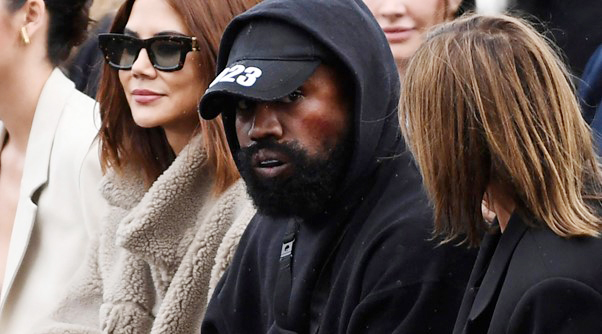
World

Adidas breaks ties with West amid mounting pressure over antisemitic comments
Published
2 years agoon
By
Andrew LapinJTA – Athletic wear company Adidas is ending its relationship with Kanye West, days after the rapper boasted that he could “literally say antisemitic sh** and they cannot drop me”.
The brand faced growing criticism of its continued relationship with West, who is known as Ye, as other brands affiliated with West broke ties with him. Adidas reportedly brings in $2 billion (R36.6 billion) a year through its Yeezy brand, accounting for about 10% of the company’s revenue.
Now, the brand will stop making Yeezy products and stop all payments to West and his companies, Adidas announced in a statement on 25 October. The company said it expected to lose up to $250 million (R4.6 billion) in revenue in the next three months, in part because of the onset of the holiday season.
“Adidas doesn’t tolerate antisemitism and any other sort of hate speech. Ye’s recent comments and actions have been unacceptable, hateful, and dangerous, and they violate the company’s values of diversity and inclusion, mutual respect, and fairness,” the company said in the statement. “After a thorough review, the company has taken the decision to terminate the partnership with Ye immediately.”
The decision came shortly after a United States-based marketing executive at the German company criticised her employer for not acting in response to the antisemitism espoused by West, who vowed on social media to “go death con 3 on Jewish people” earlier this month. It was the latest in mounting public pressure on the company, whose founders were Nazis and which produced weapons for the Nazis during World War II.
“As a member of the Jewish community, I can no longer stay silent on behalf of the brand that employs me,” Sarah Camhi, a director of trade marketing, wrote on LinkedIn on 24 October. “Not saying anything is saying everything.”
A number of other major brands have cut ties with West since his original posting and in the wake of subsequent tirades against Jews. Twitter and Instagram shut down his accounts. The fashion tastemakers Balenciaga and Vogue have announced they will no longer be working with him. Hollywood talent giant CAA has dropped him, and a planned documentary about him has been scrapped. His ex-wife and the mother of their children, Kim Kardashian, took to social media to condemn antisemitism, albeit without naming West.
Neo-Nazi groups used West’s words to go after Jews, unveiling an antisemitic billboard in Los Angeles that was condemned by the White House earlier in the week.
Adidas said in its announcement that it retains ownership over past designs in the Yeezy line, and would share more in a call with company stakeholders next month.
Although Adidas has Nazi origins, its founding pre-dates the Nazis’ rise. The company was founded in 1924 in Weimar-era Germany as the Gebrüder Dassler Schuhfabrik (Dassler Brothers Shoe Factory), or Geda for short, by cobbler brothers Adolf (“Adi”) and Rudolf Dassler.
Based in the Bavarian town of Herzogenaurach, the Dassler brothers quickly made a name for themselves by pioneering some of the earliest spiked shoes – drilled through with nails to help runners on uneven terrain.
On 1 May 1933, with the company’s fortunes on the rise and Hitler having just assumed power in Germany, the Dassler brothers formally joined the Nazi party, according to journalist Barbara Smit’s book Sneaker Wars, a history of Adidas.
The Nazis embraced sport as a tool both to boost Germany’s public profile and to train its future armies of young men, so the pioneering shoe company fit nicely into their schema. Under Nazi rule, the Dasslers’ sneaker sales promptly exploded, and they grew the size of their company several times over.
During the infamous 1936 Berlin Olympic games, orchestrated by Hitler in an attempt to demonstrate Aryan athletic supremacy on the world stage, many of the German athletes sported Dassler shoes.
But so did Black American track and field star Jesse Owens, whose very presence at the games was a thumb in the eye of Hitler’s race theories.
Rudolf was a more ardent devotee of Nazi ideology than Adi, according to Smit, but both brothers carried their party membership cards and signed off their letters with “Heil Hitler”.
During the war, the brothers’ shoe factories were converted into munitions factories for the Nazi military. (Other German shoemakers would test their products on forced labourers in concentration camps.) Rudolf was called to join the war effort, but went AWOL as part of his bid to wrest control of the company from his brother, whom he became convinced was scheming against him.
According to Der Spiegel, some American troops were poised to destroy the Herzogenaurach factory, which employed some forced labourers, in April 1945, before Adi’s wife, Käthe, approached them and convinced them that the building was only being used to make sneakers. It worked.
The factory was saved, and when the United States Air Force took over the Nazis’ Herzogenaurauch air base, American troops who were fans of Jesse Owens bought Dassler shoes and helped spread the word about the company back home.
Ironically, the end of World War II was only the beginning of the fight between the Dassler brothers, each of whom (along with their wives) tried to wrest the shoe empire away from the other.
When Germany entered its post-war denazification period, Allies forced the town of Herzogenaurach – including, presumably, the Dasslers and their factory employees – to watch documentary footage of the horrors visited upon Jews at Nazi concentration camps. Rudolf was also arrested, suspected of feeding information to the Gestapo, and briefly sent to a German prisoner-of-war (POW) camp for his role on the frontlines, but was freed one year later owing to the backlog of cases against POWs.
Meanwhile, Adi was accused of having actively aided and supported the Nazis during the war, but was able to put together a dossier of people – including the town’s mayor – to support his claim that he was far from a party loyalist.
The siblings’ relationship suffered a permanent rift in 1949, leading Adi to form his own company as Adidas, while Rudolf went off to start rival sportswear company Puma. Both companies remain headquartered in Herzogenaurach, and the town’s residents remain bitterly divided over brand loyalty to this day.
Jewish athletes have worked with the company in the decades since the war. In 1972, at Adidas’ suggestion, American Jewish Olympic swimmer Mark Spitz carried a pair of their shoes to the podium during his medal ceremony. And last year, Adidas Israel built a campaign around a haredi Orthodox marathon runner.
Adidas has also occasionally waded into geopolitical waters with the Israeli-Palestinian conflict. In 2012, the company was boycotted by Arab states for sponsoring the Jerusalem Marathon, which ran through disputed territory. And in 2018, the company ended its sponsorship of the Israel Football Association, a development celebrated as a victory by the Boycott, Divestment, Sanctions movement because the association had included teams representing Israeli settlements. (Puma took over the sponsorship.)
In spite of the “corporate social responsibility” movement that many companies have embraced in the aftermath of 2020’s racial-justice protests, the idea of corporations like Adidas having a sense of social responsibility remains elusive, according to Josh Hunt, the author of University of Nike: How Corporate Cash Bought American Higher Education.
“Sneaker companies, like all corporations, are amoral,” Hunt told JTA. “They will do what is unseemly until it becomes unprofitable, whether that means exploiting forced labour in Xinjiang or collaborating with Nazis.”
Published with permission from jta.org










